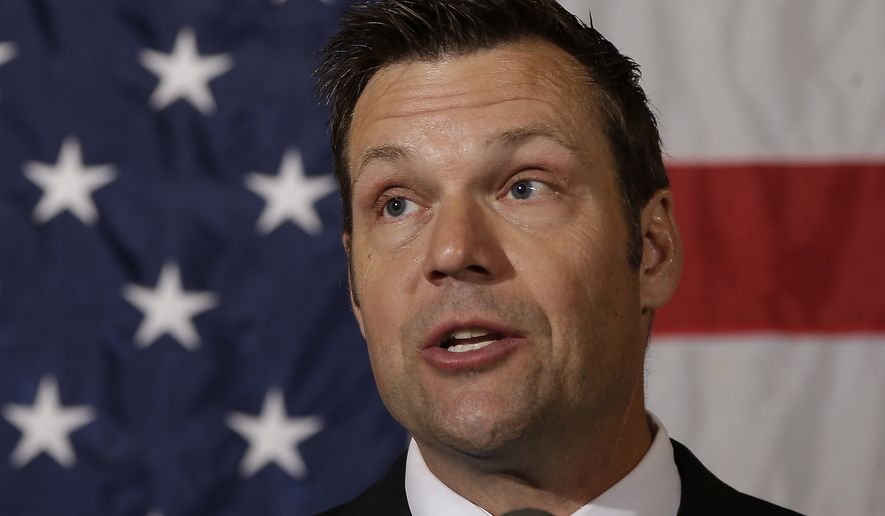A federal official overstepped his authority by allowing three states to demand proof of citizenship on the national “motor-voter” forms that help many Americans register to vote, the Obama administration and allied groups argued Wednesday in a case that pits one part of the federal government against another.
The League of Women Voters said eligible voters in Kansas, Alabama and Georgia will be turned away in a pivotal election year because the U.S. Election Assistance Commission’s executive director waded into a “clear question of policy” that can be tackled only by commissioners of the independent agency.
“The practice is clear,” Michael C. Keats, an attorney for the league, told U.S. District Court Judge Richard J. Leon in the District of Columbia, pleading with him to block changes to the federal form’s instructions in all three states until their lawsuit is decided on the merits.
Kansas Secretary of State Kris Kobach rejected those arguments in a lengthy rebuttal, saying the commission never set down a policy against requiring proof of citizenship, so Executive Director Brian D. Newby made the right call.
Mr. Kobach agreed instead with Judge Leon, who said groups that register Kansans to vote will advise people about the citizenship rules anyway because they apply to state elections, so it is unclear who would be harmed by changes to the federal form that Americans grab when they apply for a state driver’s license.
“You hit the nail on the head,” Mr. Kobach said.
The lawsuit is unfolding in a topsy-turvy election year, as Republican renegade Donald Trump and Democratic front-runner Hillary Clinton try to pin down their parties’ nominations ahead of a drag-out fight for the White House.
The outgoing Obama administration, in an unusual twist, has refused to defend the Election Assistance Commission, even though that is their natural role. Instead, it sided with its allies in the fight against state laws that are pitched as shields against voter fraud but attract criticism from those who say they merely keep minorities and other Democrat-leaning voting blocs way from the polls.
Judge Leon, appointed by President George W. Bush, didn’t signal Wednesday whether he plans to block Mr. Newby’s decision, but he made one thing clear: Time is wasting, and any appeal of his decision on whether to issue a preliminary injunction will sit for months before the U.S. Court of Appeals for the D.C. Circuit.
“Is this case going to be resolvable before November?” he said, noting that one side will not like how he rules. “I’m not that Solomonic.”
Actions by the Election Assistance Commission typically require approval from three commissioners. Yet with two Republican commissioners, one Democrat and one vacant seat, the board is essentially deadlocked, meaning the case centers in part on what the executive director can do.
The Justice Department said the court ought to scrap Mr. Newby’s unilateral decision and remand the case so that it gets a clear decision from three commissioners.
Judge Leon worried that might eat up more time because the commissioners may waffle on a decision.
Mr. Kobach said it would be better to send the case back to the commission without striking down Mr. Newby’s decision, in case they can’t reach a consensus, or to simply ask the executive director to explain his decision.
In their complaint, though, the plaintiffs said Mr. Newby served as election commissioner in Johnson County, Kansas, for years before he was appointed to the commission, so he effectively worked under Mr. Kobach for a time.
They said his actions “are the latest chapter in a continuing and relentless campaign” by certain states to require proof of U.S. citizenship on the federal form, starting with Arizona in 2006.
The administration and its allies have resisted state-driven changes to voter ID laws, particularly in the wake of the Supreme Court’s Shelby County v. Holder ruling that punched a hole in a key test for discrimination under the Voting Rights Act.
Mr. Kobach said Georgia and Alabama haven’t enforced their proof of citizenship changes, in part because they had to wait for the 2013 decision.
Yet Kansas is already operating under its proof-of-citizenship law, and it would be cumbersome to sift through who can vote in state elections and who can vote only in federal contests. Though it recently held its presidential caucuses, its primary elections for other races will be Aug. 2.
“We’d be yo-yoing back and forth” if the judge blocked the federal instructions, he said, causing “huge confusion for voters.”
He also said the plaintiffs are overstating the potential harm of requiring proof of citizenship. The state says 94 percent of people who start the process complete it, while half of the remaining 6 percent simply move out of state before they finish. The others, he said, are likely noncitizens or people who have decided not to vote.
“You can’t have theoretical injury,” he said, “that someone might get discouraged somewhere.”
• Tom Howell Jr. can be reached at thowell@washingtontimes.com.




Please read our comment policy before commenting.